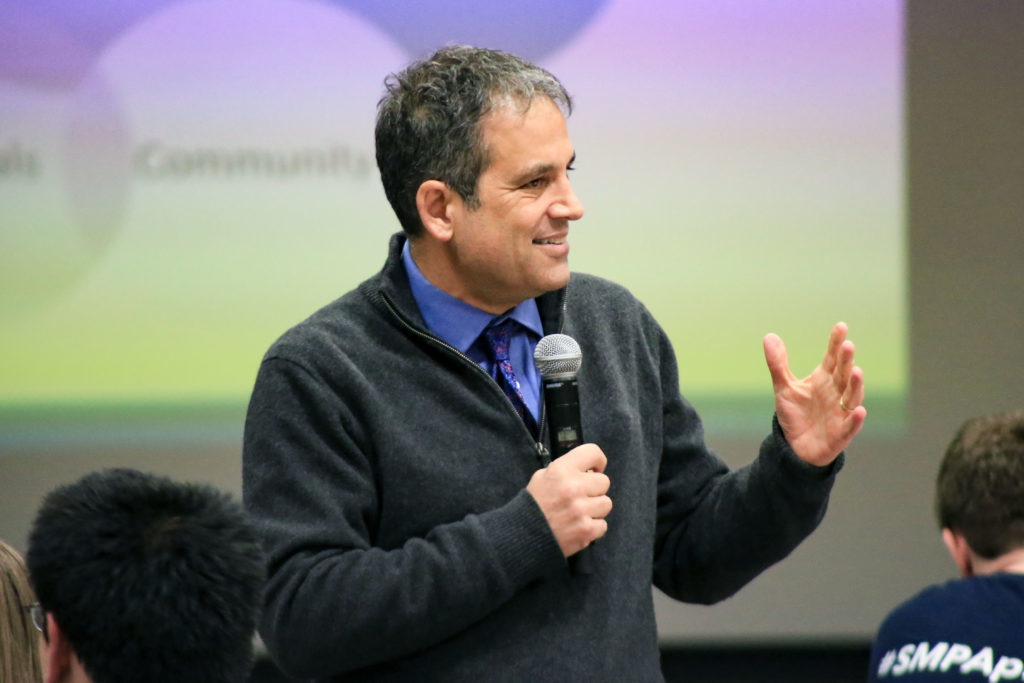Administrators and members of the Board of Trustees are asking students how to improve GW.
The Board’s student experience task force has hosted five roundtable discussions since November to ask for insight on students’ experiences in the financial, health and safety, and facilities aspects of the University, officials said. Students who participated in the roundtables said the discussions were direct ways for students to give feedback to officials at the highest level of University decision-making.
Provost Forrest Maltzman said the main goal of the discussion sessions is to answer the question: “What are the guiding principles that will improve the student experience?” The student experience task force, which the Board formed last summer, will then use what is said in the discussions to craft recommendations to better student life at GW, he said.
Student feedback from the sessions also factored into the decision to create a combined office for student affairs and enrollment beginning this summer.
“The listening sessions are interactive and students are given the opportunity to provide input on various components that make up the students experience such as community, facilities, academics and financials,” he said in an email.
The most common concerns students expressed in the meetings include longstanding issues like the affordability of the dining program, the need to renovate Thurston Hall and the importance of the Vern Express, he said.
He said officials are planning to hold about 10 student sessions in total, with around 30 to 50 students in each meeting. The task force will also host listening sessions for faculty and staff later this semester, he added.
Student Association President Peak Sen Chua, who is a voting member of the task force, said about 20 to 40 students have attended each of the discussions, held in various locations like District House or on the Mount Vernon Campus. He said that during the sessions – which last about two to three hours – administrators and trustees ask students to participate in an exercise where they’re given several stickers to put on a wall underneath top areas of improvement to the University.
The stickers can be placed under categories like academics, community or financials, and then an administrator will tally up which topics received the most stickers to initiate a conversation. Campus community usually tops the list, he said.
“It’s been one of our priorities as SA leaders to more intentionally engage our community because there is always work to be done there,” he said. “I think that we’re trying to increase our engagement with the community, and we’re trying to get trustees and admin to do that, too.”
He said the sessions will influence the recommendations of the Board’s task force, which is expected to release its proposals by the end of the calendar year. At least two trustees, W. Scott Amey and Cynthia Steele Vance, have attended multiple sessions, Chua said.
“They don’t want to be presented to, they want to engage in conversations with students,” he said. “I think this provides administrators with a good opportunity to engage with students while forming those guiding principles.”
SA Executive Vice President Sydney Nelson, also a voting member of the task force, said the SA worked with the provost’s office to identify “student populations that we believe would represent a cross section of the University.” She said student groups like SA members, resident advisers, freshmen, student employees and athletes have been invited to specialized sessions.
During the sessions, she said students talked extensively about a lack of community on campus, saying the University doesn’t do enough to promote a campus culture and that often, student organizations are left to fill in the gaps.
“Institutional culture is a huge one, and that this affects all aspects of the University – being treated as a person and not a number, feeling like you have an advocate wherever you are on campus,” she said.
Nelson also pointed to topics like affordability, food insecurity and academics – especially reforming the advising system to make it “feel like it’s a personalized experience rather than just being pushed through to get a degree.”
Logan Malik, the SA’s director of sustainability, said that when he attended one of the roundtable discussions in the fall, he put all of his stickers under “institutional culture” during the administrative activity because it “affects everything in the University.”
“The general philosophies by which we conduct ourselves fundamentally dictate everything, and based on my experience and based on me hearing about the experiences of others, institutional culture here is definitely something we can improve,” he said. “The transactional nature of the institution is related to, perhaps, our culture.”
Mark McKibbin, a resident adviser in West Hall, said that during one of the discussions he attended for RAs this month, students talked about shortcomings of the Colonial Health Center – like being misdiagnosed – and a lack of trust in the center after its director unexpectedly resigned last fall.
“I will say this after that meeting with the provost, in addition to the president coming and speaking to our RA group, I felt more optimistic about administrators’ willingness to address the issues than I ever did my freshman year, to be very honest,” he said.





